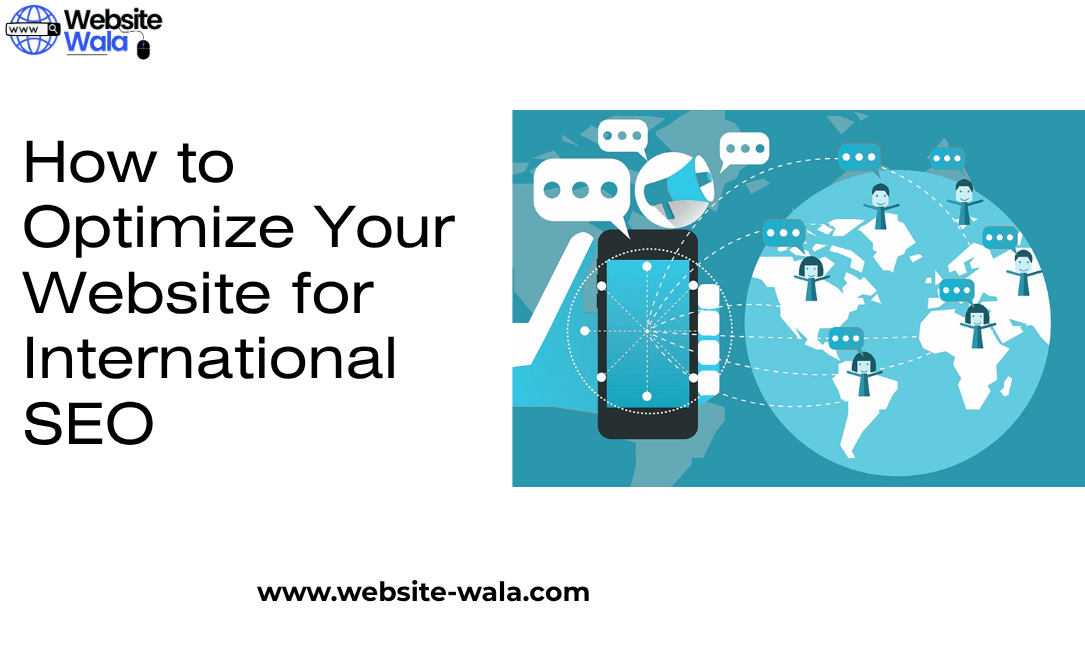
Learn How to Optimize Your Website for International SEO with expert strategies to reach global audiences, increase visibility, and boost website traffic.
How to Optimize Your Website for International SEO
Expanding your business to reach global audiences is an exciting opportunity, but it comes with challenges—especially when it comes to search visibility. Knowing How to Optimize Your Website for International SEO can make the difference between a global success and a missed opportunity. By tailoring your website optimization strategies for multiple countries and languages, you can increase visibility and increase traffic from markets worldwide.
This guide provides comprehensive, step-by-step international SEO expert tips on How to Optimize Your Website for International SEO effectively and sustainably.
What Is International SEO?
Before diving into How to Optimize Your Website for International SEO, it’s important to understand what international SEO really means. International SEO is the process of optimizing your website so that search engines can easily identify which countries and languages your content is targeting.
Unlike traditional website optimization, which focuses on ranking within a single country or language, international SEO ensures that users across different regions can find the most relevant version of your website. For example, a company might have a .co.uk domain for the UK, a .de domain for Germany, and localized content for each market.
Why International SEO Matters
If your business serves or wants to serve customers in multiple countries, understanding How to Optimize Your Website for International SEO is crucial. Without proper website strategies, your site could lose visibility in local search results.
Effective international SEO helps you:
-
Increase visibility in search engines across different regions.
-
Increase traffic from new international markets.
-
Provide relevant, localized content to your global audiences.
-
Strengthen your brand authority on a worldwide scale.
Ultimately, international SEO ensures that each of your target markets sees your content as relevant, trustworthy, and valuable.
Step-by-Step Guide on How to Optimize Your Website for International SEO
Let’s break down the process of How to Optimize Your Website for International SEO into clear, actionable steps that align with best practices.
1. Choose the Right Domain Structure
One of the first website strategies for international SEO is selecting an appropriate domain structure. The structure you choose helps search engines understand which country or region your website targets.
Common domain options include:
-
ccTLDs (Country Code Top-Level Domains): e.g.,
example.fr,example.de-
Best for targeting specific countries.
-
-
Subdomains: e.g.,
fr.example.com-
Easier to manage for multilingual websites.
-
-
Subdirectories: e.g.,
example.com/fr/-
Efficient for managing multiple regions under one domain.
-
Selecting the right domain structure is a foundational part of How to Optimize Your Website for International SEO because it influences how your site ranks globally.
2. Implement Hreflang Tags
When discussing How to Optimize Your Website for International SEO, hreflang tags are essential. These HTML attributes tell search engines what language a page is in and which region it targets.
For example:
<link rel="alternate" href="https://example.com/fr/" hreflang="fr-fr" />
Using hreflang tags correctly helps prevent duplicate content issues and ensures that users in each country see the right version of your site.
This step is crucial for businesses with multilingual pages, as it directly impacts website optimization and increase visibility across diverse regions.
3. Localize Your Content for Global Audiences
Localization goes far beyond translation. To truly increase traffic and engagement, tailor your content, visuals, and cultural references to each region’s preferences.
Tips for localized content:
-
Use native keywords that match how people search in that language.
-
Adapt your tone and examples to suit local cultures.
-
Ensure currency, date formats, and measurements align with regional standards.
This personalized approach demonstrates that you understand your global audiences, which builds trust and improves rankings in international search results.
4. Optimize Technical SEO for International Performance
When mastering How to Optimize Your Website for International SEO, technical performance cannot be ignored. Search engines favor fast, secure, and mobile-friendly websites.
Technical optimization checklist:
-
Page speed: Use CDNs (Content Delivery Networks) to reduce loading times globally.
-
Mobile optimization: Ensure your site provides a seamless mobile experience.
-
Secure connection: Always use HTTPS.
-
Structured data: Implement schema markup to help search engines understand your content.
Improving your site’s technical health enhances overall website optimization and helps increase visibility in global markets.
5. Conduct International Keyword Research
Keyword research plays a vital role in How to Optimize Your Website for International SEO. Simply translating your existing keywords rarely works because search behaviors vary by region.
International SEO expert tips for keyword research:
-
Use tools like Google Keyword Planner or Ahrefs with regional filters.
-
Identify country-specific search trends and local slang.
-
Target long-tail keywords relevant to each region’s buying intent.
This localized keyword approach ensures your content aligns with user intent, boosting your potential to increase traffic from diverse regions.
6. Create Multilingual Meta Tags and URLs
Meta titles and descriptions are the first impressions your international visitors see in search results. When learning How to Optimize Your Website for International SEO, always translate and localize meta elements.
Best practices:
-
Write unique meta descriptions for each language.
-
Use region-appropriate keywords.
-
Maintain URL consistency and clarity across all localized pages.
Localized meta data helps increase visibility and click-through rates from international search results.
7. Build Local Backlinks
Building high-quality backlinks from regional websites is one of the most effective international SEO expert tips. Local backlinks signal to search engines that your website is trusted and relevant within specific regions.
Strategies include:
-
Partnering with local influencers and businesses.
-
Guest posting on regional blogs.
-
Listing your business in local directories.
These tactics enhance your website optimization and authority, leading to better rankings in local search results.
8. Use Geotargeting in Google Search Console
Google Search Console allows you to set a specific target country for your website or subdomains. If you’re focusing on one primary market per domain, this feature is invaluable.
While understanding How to Optimize Your Website for International SEO, remember that geotargeting complements hreflang tags and domain strategies, ensuring your content appears in the right local searches.
9. Monitor and Analyze International SEO Performance
The final step in How to Optimize Your Website for International SEO is to continually track performance.
Use tools like Google Analytics, SEMrush, or Ahrefs to measure:
-
Organic traffic by region.
-
Keyword rankings across countries.
-
Conversion rates for each market.
Analyzing this data helps you refine your website strategies, adjust localization efforts, and continuously increase traffic and visibility across markets.
Common Mistakes to Avoid in International SEO
While learning How to Optimize Your Website for International SEO, avoid these pitfalls:
-
Using automatic translation tools without review.
-
Ignoring regional search intent differences.
-
Forgetting hreflang implementation.
-
Overlooking mobile and page speed optimization.
Avoiding these mistakes will keep your international SEO efforts efficient and effective.
Conclusion: Mastering How to Optimize Your Website for International SEO
Understanding How to Optimize Your Website for International SEO is key to unlocking your brand’s global potential. From choosing the right domain structure and implementing hreflang tags to creating localized content and monitoring performance, each step contributes to long-term success.
With consistent effort and the right international SEO expert tips, you can increase visibility, increase traffic, and build lasting connections with your global audiences.























